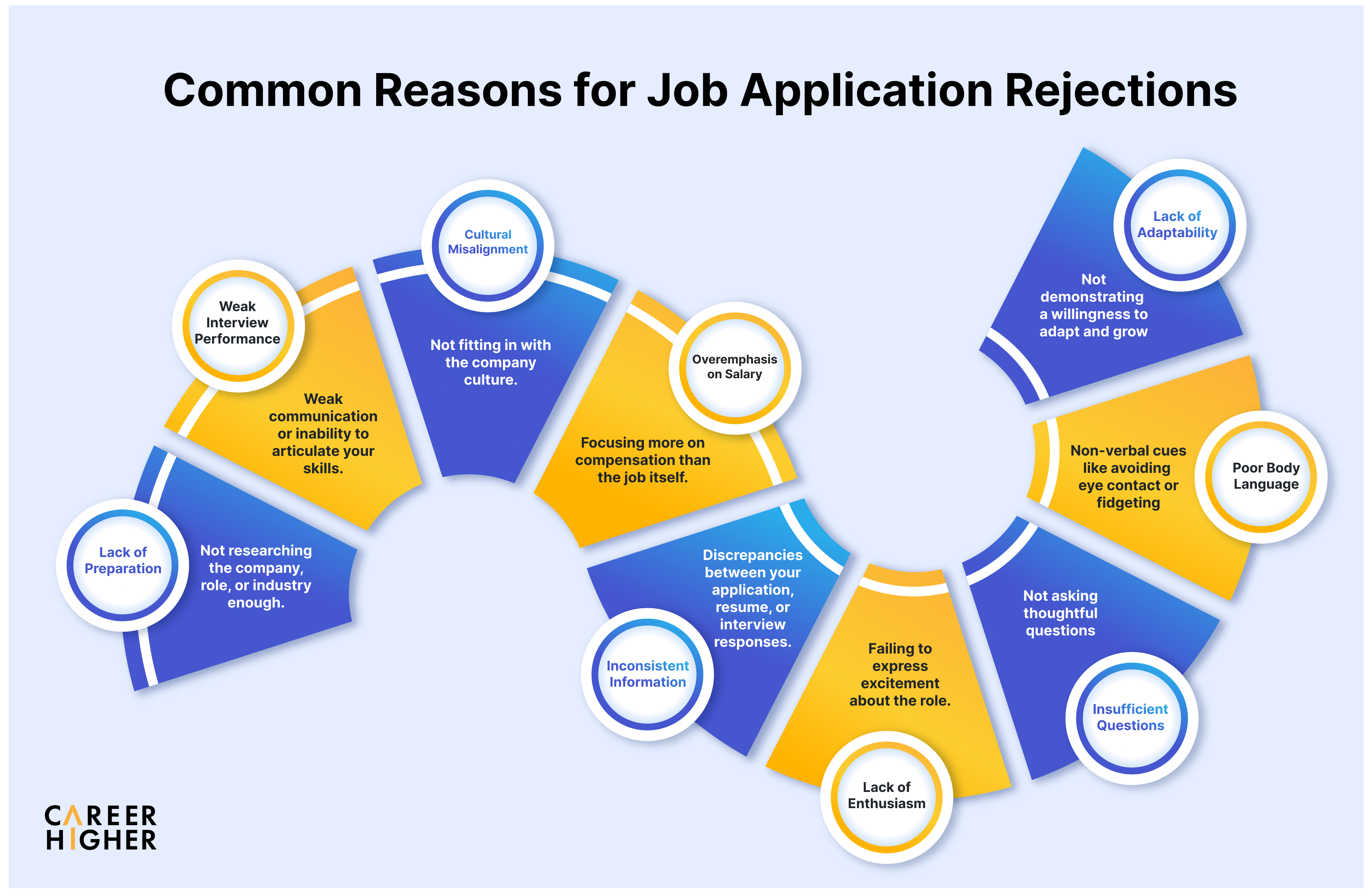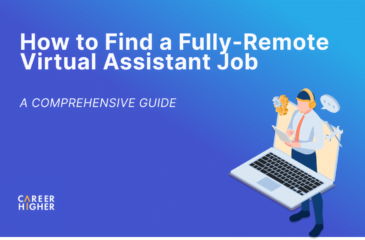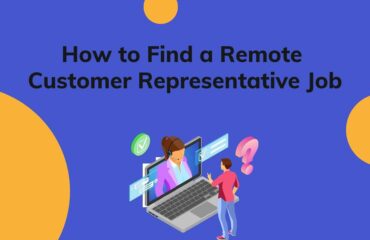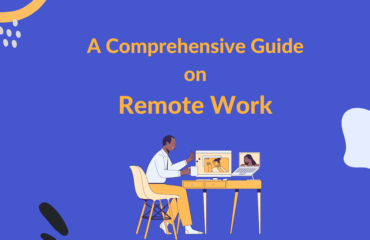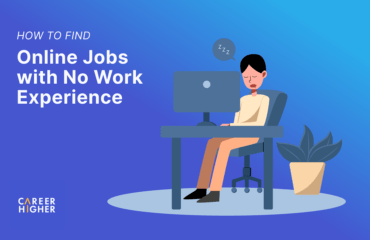Table of Contents
Job-hunting is a thrilling journey filled with excitement for potential opportunities and obstacles to conquer along the way. In any job search journey, application rejections are common. These can often feel like daunting roadblocks, attempting to throw you off-course from your goals.
Getting rejected after investing your substantial effort, time, and emotions into a job application can be triggering. It can make you question your competency, determination, and goals, bringing down your self-esteem. But remember, a rejection email is not a personal defeat. In this article, we’ll explore how you can turn an unsuccessful interview into a valuable learning experience and a gateway to new opportunities.
1) Process Your Emotions in the Right Way
When you receive a rejection email after an interview, disappointment is a natural first response. That sinking feeling reflects the depth of your desire for the role, which is difficult to get over with. It’s completely normal to feel down, but there are also ways to channel your frustrations into something positive. Let’s see some of these below.
a) Practice Self-Reflection
Take some time to acknowledge and process your frustration. Think of it as the space needed to cope and build back your confidence for your next job application. Give yourself a couple of days, not to sulk, but to regroup and reorient. Reflect on your career goals while focusing on your achievements. This will help you maintain a clear picture of your proven abilities, not just the rejection.
b) Talk to Your Support System
Rejection can sometimes feel isolating. It can make you feel small and ashamed, as though you’re the only one facing this challenge. Truth is, you’re not. Talk to your friends, family, or professional mentors who have likely faced their own share of rejections. Reach out to those in your circle who uplift and inspire you. Share your feelings, ask for advice, and allow their experiences to expand your perspective. Surround yourself with supportive people who will remind you of your abilities and potential, especially during moments when you doubt yourself. You can learn a lot by listening to other people’s perspectives of you.
2) Understand Why You Were Rejected
Receiving an employment rejection letter can sting, but it shouldn’t stop you from seeking feedback. There are many reasons why you could be rejected. It could be because another candidate demonstrated their skills efficiently or it could be because their approach complemented the company culture better. In any case, instead of assuming the worst, ask the interviewer.
a) Ask for Feedback
After you receive a job rejection letter, we recommend responding with a polite request for feedback along with a message of gratitude. Aside from gaining valuable knowledge about yourself, responding to an employment rejection letter also ensures that potential future communications remain open. Moreover, constructively asking for feedback demonstrates your willingness to learn and reflects on your character positively. When you leave this impression, it can also encourage hiring managers to keep you on top of their minds when hiring again. Here’s a sample letter you can use:
Dear [Hiring Manager’s Name],
I want to express my gratitude for the opportunity to interview for the [Position Title] role at [Company Name]. While I am disappointed to learn that I was not selected, I am eager to learn and grow from this experience.
As I strive to refine my skills for future opportunities, understanding areas for improvement would be greatly beneficial. Any feedback you could provide regarding my application and interview performance would be sincerely appreciated.
Thank you once again for considering my application and for your attention to this request. I look forward to hearing from you.
Warm regards,
[Your Name]
b) Analyze the Feedback
Not every employer will respond to your request, but the ones that do will most likely have responsible hiring managers who actually pay attention to candidates. Once you receive a response, make sure to put it to good use by analyzing it objectively. Some feedback may also contain comments that unintentionally hurt your feelings. At this time, it’s best to set aside how you feel about the feedback and focus on rationalizing it. Compare it with the feedback you’ve received from other interviews. Do you recognize a pattern? Are there skills or traits that frequently come under critique? Make notes of these and create your own action plan to target these shortfalls. Leverage these criticisms by turning them into learning opportunities, helping you improve for your upcoming interviews.
3) Develop a Mindset of Resilience
Think of rejection as a hurdle, not a dead-end. Every rejection letter you receive is a step closer to a successful one. As you interview with more companies, you get a better understanding of the process, the common questions, and how to naturally interact with interviewers. Internalizing this mindset allows you to approach job application rejections as stepping-stones toward your goals rather than setbacks. Shift your negative thoughts into this mindset so you can approach each job application with a positive and motivated outlook.
Aside from your internal motivation, it’s also nice to get inspiration from other people’s stories. Take Walt Disney for instance, who was once fired for “lacking creativity”, and yet he found success in building The Walt Disney Company. There’s also Thomas Edison, who ran countless unsuccessful experiments before finally inventing the light bulb. These stories reiterate that rejection isn’t final. It can empower you to strive harder for better opportunities in the future.
4) Create an Action Plan
Based on your feedback analysis and advice from your support network, you can create an action plan. This action plan will serve as a clear outline of what you need to do to stay organized and focused. It could include the next steps, resources needed, and milestones to help you track progress toward your long-term goals. Let’s explore some of these below.
a) Revisit Your Long-Term Goals
Think about your long-term career goals. What roles and opportunities will help you get there? How do your recent job applications fit into it? Perhaps your past interviews didn’t match your career goals, which might have raised doubts with employers or decreased your motivation. If you’ve been trying for a while in the same field or role without success, it’s time to evaluate your approach. Are there any patterns in your job applications that might be holding you back? For example, do you always apply for jobs that require a certain level of experience or specific certifications? You may consider expanding your search criteria and applying for positions that are aligned with your experience. You can also determine what steps to take to bridge the gap between where you are now and your target goals.
b) Break Down Goals Into Actionable Steps
Once you’ve realized your long-term goal, it’s time to set SMART (specific, measurable, attainable, realistic, and time-based) goals. This keeps you on track while working towards long-term ambitions. You can break down short-term goals even further into smaller steps, helping you take things one at a time. Clear goals, paired with regular self-reflection, serve as your guide to professional success.
5) Put Your Plan Into Action
Keep your action plan in mind as you continue your job search. Consistently take proactive steps to achieve the goals you’ve set and regularly review your progress. Be prepared to adjust strategies and actions as needed to further improve your chances of success. Make sure to dedicate allocated time to continually refine your skills and improve your job application materials. Let’s see how you can do these in detail below.
a) Enhance Your Soft Skills and Hard Skills
Start with a key question, “What are the soft skills and hard skills required for your long-term goal?” The skills and qualifications that are repeatedly mentioned in the job descriptions of your target roles should be your focus as these can often turn the tide in your favor. Moreover, if feedback from employers frequently mentions favoring candidates with a particular skill, it’s a good sign to develop these skills. For this, you can earn certifications by pursuing online courses or attending workshops.
b) Update Your Resume and Cover Letters
As you update your skills, you should also update your resume and cover letter to reflect your relevant experience, skills, and certifications. We strongly recommend customizing your resume to the job description to stand out from the candidate pool. You could also prepare a master cover letter to use as a template and then customize it for each job application. This will save you time and ensure that your resume and cover letter are tailored to the specific position.
6) Maintain a Healthy Perspective
When looking for a job, it’s easy to get overwhelmed by the process and overlook your well-being. However, going through multiple rounds of interviews and customizing resumes while dealing with rejections requires a healthy perspective. During these times, nurturing your well-being is just as important as pursuing your professional goals for your long-term success and happiness. Embrace these habits to maintain a healthy mindset.
a) Practice Self-Care
Never underestimate the importance of self-care within this journey. Taking time for yourself, practicing mindfulness, and engaging in activities that bring you joy can help you maintain a healthy perspective. When you feel good, it’s easier to bring your best self during interviews. By taking good care of yourself, you can stay motivated and persistent throughout your journey.
b) Be Patient and Persistent
On average, job hunting can take 3-6 months from start to finish. Success is not instant, that’s why patience and persistence are the core of this journey. While taking actions to improve yourself can boost your chances of success, most times, the hiring manager’s choice is just out of your control. Understand that rushing the process won’t necessarily yield your desired results. Enduring patience combined with consistent efforts for improvement will pave the way to your success.
c) Keep on Learning
Successful people embrace lifelong learning. As financial mogul Warren Buffet famously said, “The more you learn, the more you earn.” Embrace a mindset of continuous learning—investing time and energy in learning broadens your knowledge and hones relevant skills. Practice your skills by initiating personal projects, taking up freelance work, volunteering, or participating in internships. These actions will not only strengthen your CV but also solidify your professional image and commitment to your career.
Dealing with rejection takes grit, but with the right tools and the right mindset, you can turn it into opportunities for personal and professional growth. Follow our guide to put yourself in a better position for your next job application. For a better chance of job interview success, consider seeking help from our experts. We aim to make your interview preparation experience easier, helping you convert more job interviews into suitable job offers.

